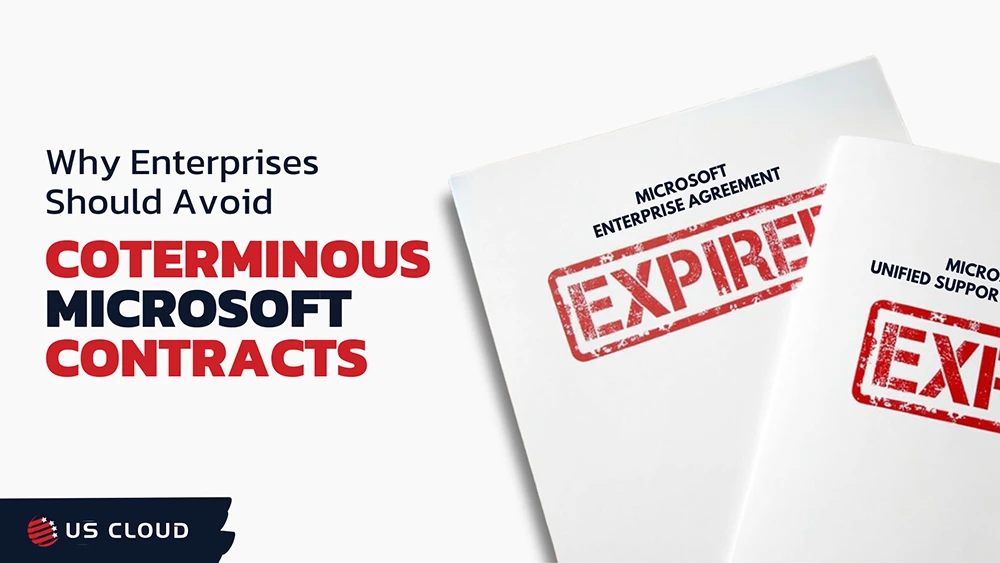
Why Enterprises Should Avoid Coterminous Contracts for Microsoft EA and Unified Support.

During certain times of the year at Microsoft, it’s contract cotermination season. Clients’ Microsoft Enterprise Agreement (EA) and Unified Support contracts expire simultaneously in what looks like a neat and tidy contract renewal process. However, although it may look handy to have to sign renewal agreements for important product and support contracts at around the same time, in reality these coterminous contracts can be incredibly restrictive on an enterprise’s growth.
In contrast, strategic separate renewal cycles for Unified Support and EA contracts can provide enterprises with a significant boost in cost management, negotiation power, and support flexibility.
Read on for more about why coterminous contracts should be strategically avoided for the good of your business. Plus, find out how US Cloud can help you steer clear of coterminous contracts altogether!

What Are Coterminous Contracts Through Microsoft?
In Microsoft terms, an Enterprise Agreement (EA, as it is currently called) is a contract for companies to use Windows Microsoft software and products. A contract for Unified Support is an agreement granting specialized tech support for customers who use Microsoft products. Although these are two different contracts, they are often paired together because businesses who rely on a Microsoft environment to function may not be equipped to resolve issues that come up within it.
In what at first glance seems to be a convenient timing for contract renewals, allowing businesses to sign up for their next contracts for both product and support at the same time, Microsoft often creates a condition called a “coterminous contract.”
Coterminous contracts happen in this case when two or more contracts are synchronized to expire at the same time. This configuration of service for product and its corresponding support prevents enterprises from optimal flexibility and cost optimization.
It is for this reason that separate renewal cycles and implementation of third-party support allow businesses the freedom to negotiate for flexible contracts, manage long-term costs, make independent vendor decisions, and more.
Separate Renewal Cycles Enhance Negotiation Power

Coterminous contracts inhibit an enterprise’s chances at leveraging for more favorable contract terms. When the contracts end, they are both simply over and businesses have no ground to stand on for bettering their contracts.
Staggered renewals, on the other hand, allow companies to leverage one contract for better terms on the other. When the needs of your business or enterprise change, your support should grow with you—not stand in your way.
An example of why negotiation for right-sized contract terms are important came from one of our clients, Parkland Health Hospital System. Their team was experiencing a system-wide issue regarding SharePoint and a crucial workflow. Director of Technical Services, Jeff Maxfield, recalls how contract limitations from direct Microsoft support prevented his team from receiving solutions for three years instead of obstacles to progress:
“…we used all of our support hours before they were able to fix it. I basically ran out of hours and then they gave me grief about how this wasn’t break-fix…they gave me the runaround on which hours to use, saying ‘You’re out of these hours and you can’t switch them’, and ‘you can’t change them’, and ‘we can’t help you until you sign a new contract’.
They were all about contracts, all about money, all about getting paid. They were not about taking care of me. They were not about making sure that my patients weren’t impacted.
So, we decided to move on. And we made it very clear when we signed on with US Cloud that this was our number one priority. Without this, we were putting patients at risk. Well, US Cloud came in, and they dedicated one engineer to it. He sat down, he met with me, met with my customers. I said, look, I don’t care what it costs, get it done.
… I can’t tell you how great it was to feel like somebody was putting me first. You just don’t get that from support these days.”
In this case, Parkland Health was freed from restricting and suffocating contract terms after switching to US Cloud, a third-party Microsoft support provider. They were also treated to the priority support they needed in order to protect each of their patients’ wellness.
Coterminous Contracts Decrease Options for Microsoft Support Flexibility

Separating Microsoft EA and Unified Support contracts means that businesses can take advantage of the extra time to investigate third-party support options. In doing so, more flexible contracts can be discovered that also reduce support costs by an average of 30-50%.
With support from businesses like US Cloud, your team can enjoy Microsoft support flexibility that direct support through Unified can’t offer:
- Flexible service scaling
- Pay-as-you-go pricing without hidden fees
- Proactive support solutions
- Reactive support solutions
- And more
With US Cloud, Microsoft support is more cost-effective because you have the freedom to cherry-pick the services you need from our team of specialists.
Decoupled Microsoft Contracts Prevent Vendor Lock-In
Coterminous agreements sometimes come with an extra helping of “take it or leave” it pressures from the company supplying the contract. In other words, independent decision-making can be limited if the vendor is in the position of power to leave a business hanging if they don’t just sign the contract renewal.
With separate renewal cycles and third-party support, you and your team can retain control over the support decisions that protect the productivity and best interests of your company.
Effective Cost Management with Stable Pricing Models
Microsoft Unified costs famously increase over time, sometimes up to five times more than Premier Support. When support costs do not balloon uncontrollably, businesses have more options for cost optimization.
For businesses seeking reliable cost-effective alternatives, US Cloud’s customized pay-as-you-go pricing model helps businesses enjoy the same level of expert support without paying for unused services.

Develop a Buffer Period for Transitions Without Coterminous Contracts
If you know it’s time to consider an alternative Microsoft support provider, you’ll need some time to scout out your options and then integrate your new provider into your IT infrastructure. Without a designated transition period, your team can expect service disruptions.
Prevent Microsoft issues from standing in the way of your team’s progress and productivity. Ensure that your Microsoft contracts are asynchronous, granting your team a peaceful and thoughtful transition to new and more flexible support options.
Know Your Legal Rights: Antitrust Implications of Coercive Contracts
Antitrust laws not only prevent companies from establishing monopolies over markets—they also prohibit companies from trapping customers in anticompetitive contracts. Contracts are not compliant with this law if they promise lower costs or threaten higher prices by leveraging one market (software) for an advantage in another market (support).
Separating your renewal cycles for your Microsoft EA and Unified Support contracts helps your enterprise avoid being subject to obligatory contract practices to begin with.
How Enterprises Can Stay in Control of Microsoft Contracts
The number one method for retaining autonomy over your decisions for Microsoft support and software is to ensure that you do not pursue coterminous contracts for Microsoft EA or Unified Support.
Without coterminous contracts through Microsoft, your team can enjoy:
- Increased negotiation leverage on Microsoft agreements
- Boosted support flexibility
- Vendor selection freedom
- Enhanced cost management
- Built-in transition planning
Evaluate your current Microsoft contracts to ensure that your agreements are stacked in your favor. Meanwhile, keep an open mind about how third-party support providers can help you optimize your Microsoft support terms and long-term cost savings.
FAQ: Microsoft’s Coterminous Contract Conditions
Why is it bad to allow my Microsoft EA and Unified Support contracts to end at the same time?
Allowing your agreements through Microsoft to terminate at the same time limits your team’s ability to negotiate better contract terms, manage costs, or prepare for transitions. It also locks you into your vendor choice whether you like it or not.
How can I avoid contract cotermination through Microsoft?
Evaluate your contracts for when they end. Make sure they are on separate renewal cycles (each ending at separate times) so that you can eliminate the disadvantages of coterminous contracts.
What are the benefits of separate renewal cycles for Microsoft contracts?
When enterprises separate their termination dates for Microsoft EA and Unified Support contracts, then can encourage continuous support coverage, retain more autonomy over their Microsoft ecosystem, and maintain increased flexibility to when it comes to changing business needs or market offerings.



